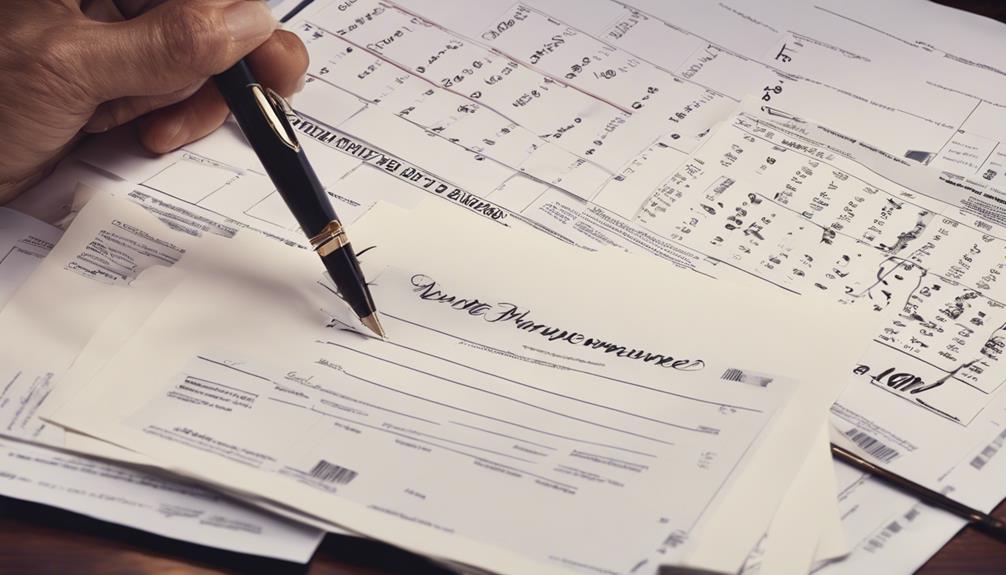In the realm of divorce, it is commonly said that knowledge is power. Before entering the process of ending a marriage in Utah, it is crucial to grasp the essential steps that will lead to a final resolution.
Understanding the residency requirements, navigating the grounds for divorce, and calculating the costs involved are just the tip of the iceberg. But what lies beneath the surface of this process is a wealth of crucial information that can make all the difference in how smoothly one transitions through this challenging chapter of life.
Key Takeaways
- Meet Utah residency requirements before filing for divorce.
- Understand grounds for divorce and choose fault-based or no-fault option.
- Hire a qualified attorney for legal guidance and financial disclosure.
- Comply with post-divorce responsibilities and seek modifications if needed.
Utah Residency Requirement
To file for divorce in Utah, we must ensure we meet the state's residency requirement, which necessitates living within the state for a minimum of three months.
However, if children are involved, the requirement extends to establishing six months of residency in Utah prior to filing for divorce.
It's crucial to note that the residency requirement for divorce in Utah specifically mandates living in the county where you plan to file for at least three months. This criterion is essential to establish legal jurisdiction for the divorce proceedings.
Therefore, before initiating the divorce process in Utah, one must carefully consider meeting the residency requirement to ensure the court has the authority to handle the case.
Meeting the residency requirement is a fundamental step that sets the legal foundation for the divorce process in Utah, making it imperative to fulfill these conditions before proceeding further.
Grounds for Divorce in Utah

In Utah, the grounds for divorce are varied and include reasons such as impotency, adultery, willful desertion, habitual drunkenness, and felony conviction. Alongside these fault-based grounds, Utah also recognizes no-fault grounds like irreconcilable differences or a 3-year separation.
Understanding these grounds is crucial as they influence the type of divorce process, whether at-fault or no-fault, that individuals must follow in Utah.
Utah's Divorce Requirements
Understanding the various grounds for divorce in Utah is essential for navigating the legal process effectively. In Utah, the grounds for divorce include impotency, adultery, willful desertion, habitual drunkenness, conviction of a felony, cruelty, irreconcilable differences, insanity, and living separately.
Here are some key points to consider regarding Utah's divorce requirements:
- Utah allows for both fault-based and no-fault divorce, with options like irreconcilable differences or living separately for 3 years.
- Residency requirement for filing divorce in Utah is living in the county for at least 3 months before initiating the process.
- Specific grounds like impotency, adultery, and felony conviction are considered valid reasons for seeking a divorce in Utah.
Fault Vs No-Fault
Navigating the grounds for divorce in Utah requires a clear understanding of the distinctions between fault and no-fault options available to couples seeking to end their marriage. In Utah, couples can choose between fault-based divorce, citing reasons like impotency or adultery, and no-fault divorce, based on reasons such as irreconcilable differences or living separately. The decision between fault and no-fault divorce significantly impacts the legal process and requirements involved in dissolving the marriage. Utah's divorce laws provide flexibility by offering both fault and no-fault options, enabling couples to select the most appropriate path based on their specific circumstances. Understanding the grounds for divorce in Utah is essential for establishing the legal basis for the dissolution of marriage.
| Fault-Based Divorce | No-Fault Divorce | Grounds for Divorce |
|---|---|---|
| Impotency | Irreconcilable Differences | Adultery |
| Adultery | Living Separately | Deseretion |
| Habitual Drunkenness | Insanity | Felony Conviction |
Common Grounds Explained
Exploring the various grounds for divorce in Utah sheds light on the legal reasons that can lead to the dissolution of a marriage in the state. When considering divorce in Utah, it's crucial to understand the following common grounds:
- Fault-Based Grounds: Utah recognizes fault-based grounds such as impotency, adultery, willful desertion, habitual drunkenness, and conviction of a felony as reasons for divorce.
- No-Fault Grounds: Couples in Utah can also seek divorce based on irreconcilable differences, which is a common ground for no-fault divorce in the state.
- Impact on Divorce Proceedings: The choice of grounds for divorce can significantly impact the divorce proceedings and potential outcomes, making it essential to carefully consider the grounds when initiating a divorce in Utah.
Cost of Divorce

The cost of getting a divorce in Utah can vary depending on several factors, including court fees, legal representation, and additional services needed during the process. Understanding the estimated expenses, financial planning tips, and being aware of potential hidden costs can help individuals navigate the financial aspects of divorce more effectively.
It's crucial to consider these points to ensure a smoother and more organized divorce process in Utah.
Estimated Divorce Expenses
Understanding the potential expenses involved in a divorce in Utah is essential for effective planning and budgeting during the legal process. Here are some key costs to consider:
- Court Filing Fees: Basic court filing fees for divorce in Utah typically range from $300 to $400.
- Attorney Fees: These fees can vary depending on the complexity of the case and the attorney's hourly rate.
- Additional Expenses: Other costs may include mediator fees, court costs, and fees for required classes.
Being aware of these expenses can help individuals prepare financially for their divorce proceedings, ensuring they're equipped to navigate the process smoothly.
Financial Planning Tips
When planning for the financial aspects of divorce in Utah, it is crucial to carefully consider the average costs involved and factor in additional expenses to ensure effective budgeting and preparation. Understanding the impact of court fees, alimony, child support, and property division is essential for managing the financial implications of divorce. Seeking assistance from a divorce financial planner or considering collaborative divorce can help in navigating these financial challenges. Below is a table summarizing key financial planning tips for a divorce in Utah:
| Financial Planning Tips | Description |
|---|---|
| Gather Financial Documents | Collect all relevant financial records such as bank statements, tax returns, and investment accounts. |
| Create Post-Divorce Budget | Develop a detailed budget outlining post-divorce expenses and income to plan for financial stability. |
| Seek Guidance from Financial Advisors | Consult with financial advisors or divorce financial planners to receive expert advice on financial matters. |
Hidden Costs Awareness
Navigating the financial landscape of divorce in Utah requires a keen awareness of the hidden costs that can significantly impact the overall expenses involved. When considering divorce costs, it's essential to factor in hidden expenses such as property appraisals, financial analysis, forensic accounting, and tax implications.
To effectively manage these financial aspects, expert consultations may be necessary to navigate the complexities of the process. Additionally, budgeting for potential fees related to mediation, custody evaluations, parenting classes, and other unforeseen expenses is crucial for financial planning during a divorce.
Understanding the full scope of hidden costs in a divorce can help individuals make informed decisions and avoid financial pitfalls throughout the proceedings.
Petitioner Completes and Files Documents

To initiate the divorce process in Utah, the necessary divorce documents must be completed and filed by the petitioner with the district court. Filing for divorce in Utah involves submitting essential paperwork, such as a petition outlining the grounds for divorce and financial declarations detailing assets and liabilities.
Accuracy is paramount, so the petitioner must ensure all required forms are correctly filled out before filing. These documents must be filed in the appropriate Utah District Court to officially kickstart the divorce proceedings. Proper completion and filing of these documents are crucial steps in the divorce process, as they provide the court with the necessary information to proceed with the case.
Ensuring all paperwork is in order and filed correctly sets the foundation for a smooth and efficient divorce process within the Utah courts, facilitating the resolution of issues such as property division and spousal support.
Domestic Relations Injunction

When discussing the Domestic Relations Injunction in Utah, it's crucial to understand that this court-issued order serves as a restraining measure to protect both parties involved.
This injunction sets legal restrictions and allowances, aiming to maintain stability and safeguard assets throughout the divorce process.
Understanding the implications of the Domestic Relations Injunction is vital to ensure compliance and avoid potential legal consequences.
Court-Issued Restraining Orders
Upon filing for divorce in Utah, individuals are subject to a court-issued Domestic Relations Injunction designed to prevent disruptive behaviors and maintain stability during the legal proceedings. It's crucial to understand and comply with the terms of this injunction to avoid legal consequences.
Here are key points to consider:
- Restrictions: The Domestic Relations Injunction prohibits actions such as relocating children out of state, harassment, and altering insurance coverage without consent.
- Purpose: This injunction aims to uphold the current situation, safeguard assets, and ensure the safety and well-being of all involved parties.
- Consequences: Violating the Domestic Relations Injunction can lead to contempt of court charges, fines, or other legal ramifications. Adhering to these guidelines is essential for a smooth divorce process in Utah.
Protecting Involved Parties
In safeguarding involved parties throughout the divorce process, the Domestic Relations Injunction in Utah serves to maintain stability and protect rights by imposing specific restrictions and guidelines. This Injunction automatically goes into effect upon filing for divorce and prohibits actions such as changing insurance coverage, selling property, harassing behavior, and relocating children without court permission.
The primary goal is to uphold the status quo and ensure the rights of both parties are respected. Violating the Injunction can lead to legal consequences, potentially resulting in contempt of court charges. To prevent complications or legal issues during a divorce in Utah, it's essential to understand and strictly adhere to the Domestic Relations Injunction outlined by the court.
Legal Restrictions and Allowances
To navigate the legal restrictions and allowances during a divorce in Utah, adherence to the Domestic Relations Injunction is essential for maintaining stability and protecting the rights of all parties involved. Understanding and complying with this injunction is crucial to avoid legal consequences.
- Automatic Effect: The Domestic Relations Injunction in Utah is automatically enforced upon filing for divorce.
- Restrictions: Parties are prohibited from actions like relocating children out of state or making significant financial changes without court approval.
- Consequences: Violating the injunction can result in contempt of court charges, emphasizing the importance of abiding by its terms to safeguard rights and assets.
Petitioner Has Papers Served

Ensuring proper service of the divorce papers in Utah is a critical step to officially notify the respondent of the ongoing divorce proceedings.
The petitioner must have the divorce papers served to the respondent within 120 days of filing to comply with Utah's legal requirements.
Proper service is essential as it officially notifies the respondent of the divorce proceedings, giving them the opportunity to respond to the petition.
Failure to serve the papers correctly can lead to delays and complications in the divorce process.
It's crucial to serve the papers in a timely and accurate manner to move the divorce case forward smoothly in Utah.
Waiting Period

Having completed the crucial step of ensuring proper service of the divorce papers in Utah, the next significant phase in the process is the mandatory 30-day waiting period before the divorce can be finalized. During this waiting period, several essential aspects come into play:
- Respondent's Response: The waiting period allows the respondent time to address the divorce petition and respond accordingly. This ensures that both parties have the opportunity to voice their perspectives and concerns.
- Negotiations and Mediation: Parties can engage in negotiations or mediation during this period to try to resolve any outstanding issues amicably. This can be a constructive way to reach agreements on important matters such as asset division, child custody, and support.
- Legal Proceedings: If necessary, legal proceedings can be initiated or continued during the waiting period. This may include court hearings or other formal processes to address contested issues and move the divorce proceedings forward.
Utah's waiting period serves as a crucial time for parties to engage in meaningful discussions, seek resolutions, and ensure that the divorce process is fair and comprehensive.
Respondent Responds

During the divorce process in Utah, the respondent's active participation is crucial, including attending the Case Management Conference to discuss progress and potential resolutions. Financial disclosures must be shared to ensure transparency and fair division of assets. The respondent can either agree on terms through a stipulation or risk a default judgment for failing to respond. Mandatory mediation may be necessary for the respondent to attempt to resolve contested issues before trial. Finally, both parties, including the respondent, must prepare final documents for court review to finalize the divorce.
| Respondent Actions | Importance | Outcome |
|---|---|---|
| Attend Case Management Conf | Discuss progress and resolutions | Ensure case stays on track |
| Provide Financial Disclos | Ensure transparency and fair asset division | Facilitate equitable settlement |
| Agree on Stipulation | Avoid default judgment | Maintain control over case resolution |
Respondents play a critical role in the divorce process, and their active involvement can significantly impact the proceedings and final outcome.
Final Documents

Finalizing the divorce process in Utah involves preparing essential documents that define the terms and agreements between the parties, such as the Decree of Divorce and the Parenting Plan. These final documents hold significant importance in ensuring a smooth and legally binding conclusion to the divorce process. Here are three key elements to consider when finalizing the divorce in Utah:
- Decree of Divorce: This official court document legally terminates the marriage and outlines the rights and responsibilities of each party post-divorce. It covers crucial aspects like the division of assets, spousal support agreements, and other relevant matters.
- Parenting Plan: If minor children are involved, this document details child custody arrangements, visitation schedules, and child support agreements. It ensures clarity and consistency in decision-making regarding the children.
- Compliance with Utah divorce laws: All final documents must adhere to Utah divorce laws to be considered valid. Ensuring accuracy and comprehensiveness in these documents is essential for a successful divorce outcome.
Divorce Decree and Aftermath

Upon receiving the divorce decree, both parties are legally bound to adhere to its terms and conditions, which outline the specifics of the divorce settlement. This important document typically covers crucial aspects such as child custody, visitation schedules, child support, spousal support (if applicable), and the division of assets and debts. It's imperative that both parties strictly follow the guidelines set forth in the decree to avoid facing legal consequences, including potential charges of contempt of court.
In the aftermath of a divorce, circumstances may change, prompting the need for modifications to the decree. Situations such as significant income adjustments, changes in employment, or relocation may necessitate alterations to the existing agreement. Seeking a modification of the decree through the appropriate legal channels is essential to ensure that the terms of the divorce remain fair and feasible for both parties involved. Failure to address necessary modifications through the proper legal process could lead to complications and potential legal ramifications.
Frequently Asked Questions
What Is the First Step in Getting a Divorce in Utah?
Ensuring residency in Utah for at least 3 months before filing is the initial step in getting a divorce in Utah. We must meet this requirement before moving forward with the divorce process.
What Steps to Take Before Asking for a Divorce?
Before asking for a divorce, we must consider Utah's residency requirement, common grounds for divorce, and potential costs. Collecting necessary information and documentation is crucial for expediting proceedings. Ensuring privacy of records is vital.
What Is a Wife Entitled to in a Divorce in Utah?
In Utah, a wife may be entitled to alimony and a fair share of marital property in a divorce. Factors like marriage length, financial resources, and contributions are considered. Legal help is crucial for understanding and negotiating favorable outcomes.
Is There a 90 Day Waiting Period for Divorce in Utah?
In Utah, there is no specific 90-day waiting period for divorce. The processing time varies based on case complexities, court schedules, paperwork, and any necessary waiting periods. Legal guidance is vital to navigate Utah's specific divorce timelines and requirements.
Conclusion
As we journey through the 10 essential steps of getting a divorce in Utah, we're guided by the light of knowledge and preparation. Like a compass leading us through rough terrain, this process requires patience, understanding, and the support of legal experts.
Let's navigate these waters with grace and resilience, knowing that the destination of a new beginning awaits us on the horizon.










